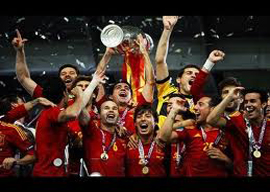
July 08, 2012

Protestantism possessed what Weber called “the spirit of capitalism”; Catholicism did not. Weber said the Catholic Church was hostile toward the pursuit of wealth while the Protestants emphasized hard work and economic success to achieve salvation.
Weber said that Protestants, unlike Catholics and believers in other gods, had become detached from magic. The fruit of their disenchantment was capitalism. Weber was definitely onto something.
Take my wife. A fiercely committed Catholic, she believes in magic (miracles) and is always trying to stop me working because all that matters in life is family and children”and salvation which is achieved not by hard work, but only by the confession to a priest of one’s sins and by drinking Christ’s blood and eating his body at Holy Mass.
So I say: “Fine, but what about the gas bill and the car insurance and the mortgage and all the rest of it?” And she replies: “They are all irrelevant. All you need to survive are bread and water.”
Unfortunately, neither Weber nor anyone else, as far as I know, ever wrote a book called The Catholic Ethic and the Spirit of Soccer.
I did a quick Web search, tapping in, “Why are Catholics so good at soccer?” Nothing. So I replaced the word “Catholics” with “Italians.” The first thing that came up was a YouTube video showing a group of Italian soccer players training”to cheat. Each time the coach blew a whistle in the short video all his players fell to the ground in spectacular style, writhing and groaning as if victims of the most terrible foul play.
Another Internet explanation, written by a woman, said that in Italy soccer is not a sport but “an art form” played with “childlike abandon” and “the incorporation of grace and an almost dance like quality.”
Clearly, this woman’s judgment has been clouded by Italian soccer players” physical beauty. For while it would fit the current Spanish team it misses the point of what primarily the Italian team is admired for from a strictly soccer point of view: its very adult iron discipline, impenetrable defense, and gecko-like ability to launch the killer counterattack.
The huge success of Catholic countries in soccer cannot be due entirely to the sign of the cross they make each time they run on to the pitch and their belief in God, who”being a Catholic”intervenes personally each time they play to ensure they win. Such an explanation would be feasible only when they defeat a heathen team such as England or Egypt, but not when they play another Catholic country.
Maybe it is because Catholics prefer sport to work and that is where they direct their energy and passion. For as Weber wrote and my wife Carla confirms: To Catholics work is an obstacle, not a means, to salvation.
When played well, soccer is a beautiful game, though as an Englishman I agree that Catholics have a much more finely tuned sense of beauty than non-Catholics such as me. The Renaissance’s extraordinary explosion of artistic beauty could not have happened in a non-Catholic country.
If only Catholic countries were able somehow to transfer the secrets of their soccer superiority to their economies, the eurozone crisis would pass away as swiftly as a summer storm.